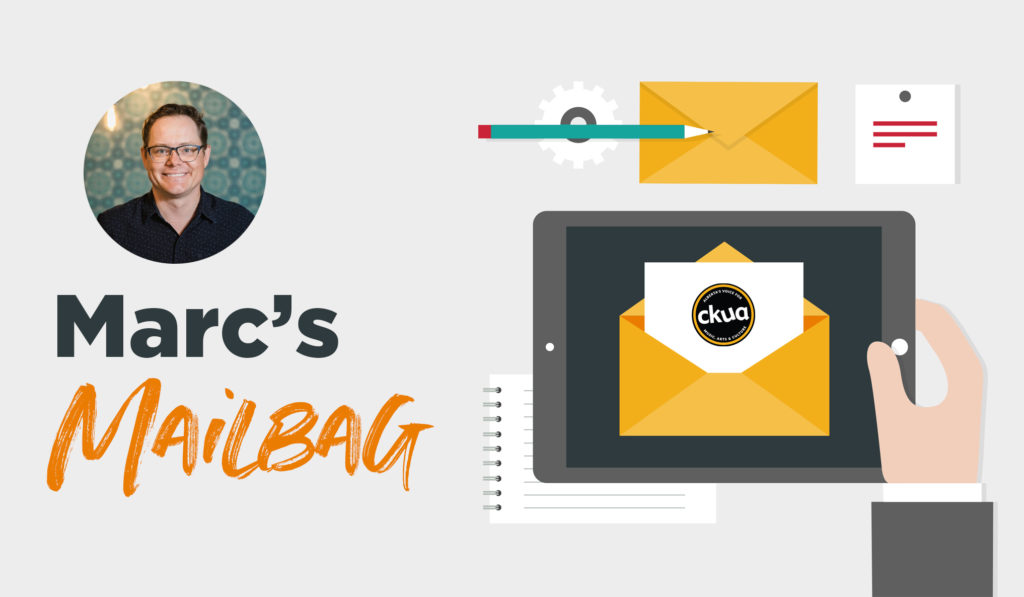
Our board chair, Lindsay Hood, was in a conversation with a CKUA fan the other day. Excited about the upcoming fundraising campaign, Lindsay asked if the gentleman and his family donated to CKUA. The response he got was: “Why would we? It’s free!”
After hearing Lindsay’s story, I thought, “Maybe it’s time to talk about how we make this ‘free.'” So, let’s talk about where donor support fits into our funding sources.
A common myth I’ve heard over the years is that CKUA is a University of Alberta station. Yes, our call sign ends with UA because we started at the U of A almost 94 years ago. It is a proud legacy, but we haven’t been associated with them for decades. As an independent, non-profit public broadcaster, we do not receive funding from post secondaries or student fees. What we are, is Canada’s first and longest-running, professional public radio station – proudly supported by our listening community.
Our funding by the numbers:
- 1% – The Government of Alberta funded us until 1997, when we were decommissioned. Then, the CKUA listening community rallied to bring us back on the air, as a listener-supported, independent charitable non-profit station. Since then, the Government of Alberta has contributed approximately $60K per year or 1% of our annual operating budget. We also apply for and receive small project grants from time to time.
- 0.5% – We aren’t eligible for most government operating grants. All orders of governments use a jury system, where peers evaluate each other to get funding. CKUA is unique in Canada. We can’t be juried by our peers since we don’t have any, making us ineligible for funding. That said, the Edmonton Arts Council contributes approximately $25K per year or roughly 0.5% of our budget. Not towards our programming, though, but because we have a performance space in Alberta Hotel. By comparison, most non-profits the size of CKUA operate with 15-40% of their operating funding from government sources.
- 8%- Business-to-business revenues (aka commercials) are the financial lifeblood of commercial radio stations. It is why you hear so many of them. Over and over again. One of the reasons listeners choose CKUA is because the commercial radio experience turns them off. Advertising, which on CKUA only makes up two minutes every hour, makes up 8% our revenue. A large portion of those revenues comes from music, arts, and culture partners promoting their events. Could we increase this revenue line? Absolutely, and we aim to, especially with a return to events in 2022. That said, historical data shows too much advertising results in donor attrition. Data also indicates that donation revenues don’t increase proportionately with less advertising. So, there’s a balance to be had.
- 14.6% – We have other business-to-business revenues, like renting office space on three floors in the Alberta Hotel (which we own). Still, it isn’t a big enough building to drive profits. Instead, it is intended to help offset some of the costs we would incur if we were renting office, studio, and music library space somewhere else.
- 67% – You. Our listeners. By a prairie country mile, you are the ones who are the lifeblood of CKUA.
Many medium-sized non-profits run on a three-legged funding stool–grantors, businesses, and individuals. You will see from the above that we are missing one leg (operating grants) by default. That puts a lot of pressure on the other two and adds much more work and effort to run CKUA every year than one might realize.
This unbalanced stool means that CKUA’s success is in your hands.
On a cash basis, this is what our funding mix looks like in a given year:
| FY 20/21 cash revenues – Unaudited (Year End is Aug 31) | ||||
| Revenue line | $ amount | % of cash revenue | Sources | |
| Public sources – annual operating grants |
81,000 | 1.5% | Edmonton Arts Council, Gov of Alberta, CKUA endowment disbursements | |
| Public sources – one-time project grants |
87,000 | 1.6% | Government & public foundation project grants | |
| Business-to-business – advertising | 425,000 | 8.0% | Advertising & sponsorships | |
| Business-to-business – assets | 775,000 | 14.6% | Venue, office & asset rentals | |
| Individuals – monthly donors | 2,100,000 | 39.5% | New and returning year-round monthly donors | |
| Individuals – annual/one-time donors | 1,850,000 | 34.8% | New and returning donors at all times of the year | |
| Total cash revenue | 5,318,000 | 100.0% | ||
We make considerable, necessary annual investments to produce the CKUA experience you want to support.
The listener-supported, professional public media sector (which, at the size of CKUA, is practically non-existent in Canada but plentiful in the U.S.) operates on two essentials: Value and Trust.
You experience something for free that is meaningful enough that you are willing to place a monetary value on it when asked to keep it going. We trust that enough people with whom we have an invisible and unknown relationship agree with you.
One of the beautiful things about public radio is that anyone can access it for free. You can’t hang a price tag on the public airwaves, we can’t charge admission to them, and they are available to everyone. But as a business model, there’s a big downside. Imagine your favourite store, or Netflix, giving away their wares for free!
I love this 2020 early COVID analogy from legendary radio consultant Fred Jacobs. It sums up the uniqueness of the professional public media sector.
Remember the days when your radio station was open 24/7, and the full staff showed up every day.
So, then imagine the boss thought it would be a cool idea to purchase a steady supply of coffee and make it available to the staff for a nominal fee. And we’re not just talking any random or generic coffee brand. The boss is into quality and insists on gourmet beans that truly make wonderful coffee–many say the best around.
The boss sets up the “honour system” for the coffee fund. When you pour yourself a cup of coffee, you’re asked to donate 50 cents.
But here’s the problem. Even though there’s always a fresh supply of great, premium coffee, not everyone who drinks it makes a contribution. In fact, only about 10% actually contribute to the fund. The rest simply drink the coffee every day, and hope others fork over the dough. Some make excuses they don’t have the funds right now. Others contend the coffee should be free to employees. But most people don’t pay for this wonderful coffee service.
Most responsible bosses wouldn’t put up with this for long. A month or two maybe. At the most, a year.
Now imagine this going on for 40 years.
Because that’s how public radio funding actually works–the honour system.
If you read the subtext in his message, you’ll notice that 10% of listeners carry the weight for everyone else. This stat is common in public media. Based on our data, our donor to listenership ratio shows that we are slightly under that 10% mark. We can do much better with your help.
With it, we would unlock more community, festival, and venue outreach across the province and beyond, music education programs, more promotion of CKUA to grow the CKUA community, engaging new hosts, music genres, and podcasts, more exposure and events featuring emerging and visiting artists from a wide variety of artistic disciplines and even CKUA On-Demand for when you miss your favourite program because life got in the way.
Fundamentally, CKUA must continue to evolve and make changes, which is why our funding needs go up. Despite rigorous cost controls, the cost of doing business always goes up. And we have to make strategic investments to evolve CKUA with the times, the technology and the music tastes of audiences of today and tomorrow. If we simply resisted making those investments and let uncontrolled change eventually force our hands, we’d be betraying the support, contributions and sacrifice of all those who came before us to make CKUA what it is today. Those who have been listening to CKUA since 1997 remember the last time change from outside of our control happened. We were decommissioned, and we went off the air.
In our last post-campaign survey, we asked donors what kind of information they wanted to hear back from CKUA. Many said they wanted to understand better where our money comes from and how we use it. It’s easy to put up a pie chart, but it only tells you part of the story. And usually, it’s only the story the reader chooses to see.
So, I hope this message and my previous one give you a better sense of the context and complexity of an organization like CKUA. How we operate, how we are funded, and what we do as a professional, charitable non-profit the size of CKUA is without equal in Canada and can’t be compared.
CKUA—free CKUA—only works because you value it and choose to support it. And we ask and trust that you will this October to the tune of $1M or more.
Please join us in our fall campaign by amplifying CKUA and helping us reach our $1M goal. We all deserve a few more good days.
Do you have a question for Marc’s Mailbag? Please write us and we’ll get it to Marc right away!

